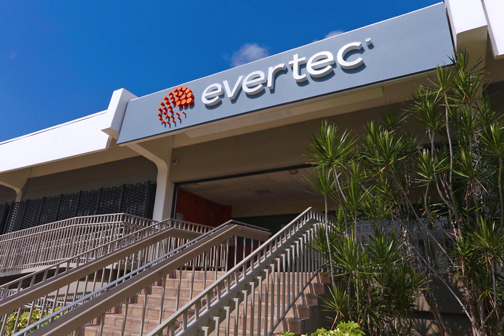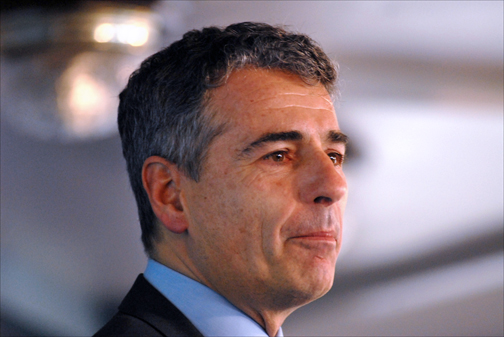Chile honors Haitian politician who spent exile years in Puerto Rico
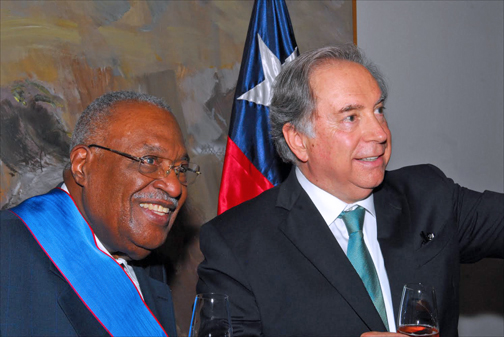
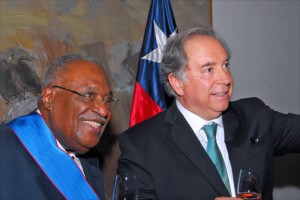
Gérard Latortue, former prime minister of Haiti, receives the “Orden de Merito” award from Juan Gabriel Valdés, Chile’s ambassador to the United States, at a Nov. 6 reception in Washington. (Credit: Larry Luxner)
WASHINGTON — Several hundred people packed the Chilean ambassador’s residence Thursday night to celebrate as Haitian politician Gérard R. Latortue received Chile’s highest honor for foreign nationals, the prestigious “Órden al Mérito.”
Ambassador Juan Gabriel Valdés, who in 2004 was appointed chief of the newly established United Nations Stabilization Mission in Haiti (MINUSTAH), placed the blue sash and gold medal on Latortue in an emotional ceremony marked by speeches in English, Spanish and French.
Latortue’s close friend and colleague, Ray Joseph, then played the religious hymn “Dieu prendra soin de toi” [God will take care of you] on his Hohner harmonica, and finally, everyone toasted the retired economics professor and reluctant politician with glasses of champagne.
Latortue, 80, became prime minister of Haiti in March 2004, following the overthrow and exile of President Jean-Bertrand Aristide. He served under Interim President Boniface Alexandre until June 2006, by which time free and fair elections had been held to replace Aristide.
Latortue is well known in Puerto Rico, having lived on the island in exile from 1963 to 1972. He resided in San Germán, where he headed the economics and business administration department at Inter-American University and is credited with playing a pivotal role in introducing the island’s first MBA program. At the same time, the Haitian scholar was a research associate at the Institute of Caribbean Studies, a division of the University of Puerto Rico.
Later on, Latortue joined the United Nations Industrial and Development Organization (UNIDO), starting as a project manager in Togo and Côte d’Ivoire, and ultimately becoming managing director of the Vienna-based agency.
After he left the UN in 1994, the academic returned to Puerto Rico, where he was elected secretary general of the Association of Universities and Research Centers of the Caribbean (UNICA). At the time, UNICA’s headquarters were at UPR’s Río Piedras campus. All three of Latortue’s daughters were born in Puerto Rico, and his brother, Dr. Paul R. Latortue, is dean of UPR’s School of Business Administration.
“He was very instrumental during his period at UNIDO in promoting our work involving twin plants throughout the Caribbean, especially with Haiti,” David Lewis, vice-president of Manchester Trade Ltd. in Washington, said of Haiti’s former prime minister. “UNIDO and the government of Puerto Rico collaborated to promote twin plans and joint ventures through CBI [the Caribbean Basin Initiative] and Section 936 funds.”
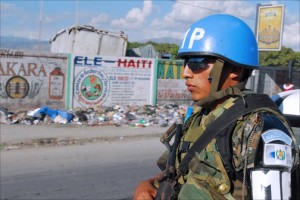
A United Nations soldier from Guatemala, part of the MINUSTAH mission, patrols a poor neighborhood of Port-au-Prince, Haiti. Juan Gabriel Valdés, Chile’s current ambassador to the United States, was appointed MINUSTAH’s first chief in 2004, shortly after Jean-Bertrand Aristide was overthrown as president of Haiti. (Credit: Larry Luxner)
Strong ties
Lewis added: “Chile and Haiti go way back. A lot of Haitians went to Chile in the ‘60s and ‘70s, before Pinochet. You find many Haitians who know Spanish because of their time in Chile.”
Valdés noted that the “Órden al Mérito” “is a distinction given to illustrious foreigners who have rendered important services to Chile.” It was founded, he said, by national hero Bernardo O’Higgins “to show appreciation for our Latin American brothers who helped us win our independence from Spain.”
For this reason, the government of Chilean President Michelle Bachelet decided to honor Latortue — underscoring a long history of cooperation between the most prosperous country in Latin America and the Caribbean, and the region’s poorest.
“In 2004, some 500 Chileans and more than 2,000 other Latin Americans went to the island to help Haitians overcome a historic moment of great division and polarization,” said Valdés. “The UN Security Council gave MINUSTAH the task of supporting the provisional government to fight violence and assist in organizing free elections that could guarantee a return to constitutional rule in Haiti.”
Without Latortue’s support, he said, MINUSTAH would have been a failure.
“Prime Minister Latortue had a clear view of his role as a peacemaker, but also as a partner. We did not always agree, but there was always respect for the functions each had to perform,” he said. “The basis of this united effort was the respect the transitional government showed toward the Haitian people. The government led by Latortue did not intervene in the process leading to the elections. It maintained its impartiality. No act of violence would alter its decision to carry out an open and free electoral process.”
Valdés, who became Chile’s ambassador earlier this year, himself had a close call with death in 1976 as an aide to Orlando Letelier, who had held the ambassadorship from 1971 until his imprisonment in 1973 following the overthrow of Chilean President Salvador Allende by Gen. Augusto Pinochet.
After Letelier’s release from a Santiago jail, he returned to Washington to rally opposition to the Pinochet dictatorship, but was assassinated in a 1976 car-bombing organized by Chile’s secret police. Valdés was supposed to catch a lift in Letelier’s car, but declined the offer because he had to stay home that morning. The bomb — which went off at Sheridan Circle, right across from the official Chilean residence — killed Letelier along with Ronni Moffitt, the wife of Letelier’s other aide, Michael Moffitt.
“We Chileans know well what transition to democracy means,” said Valdés. “Even when it begins like ours, with a plebiscite, it’s a very tough and tricky exercise. How much more difficult, therefore, was the situation in Haiti, which was plagued by crisis and chaos. The transitional government followed this dangerous but fruitful path toward peace with great courage and determination.”

Port-au-Prince headquarters of the United Nations Stabilization Mission in Haiti (MINUSTAH), whose first chief was Chile’s current ambassador to the United States, Juan Gabriel Valdés. (Credit: Larry Luxner)
Enemies of dictatorships
Like Chile’s Letelier, Latortue was an enemy of his country’s dictatorship. In 1963 — six years after François “Papa Doc” Duvalier grabbed power in Haiti — he fled to nearby Puerto Rico, where he became an economics professor at Inter-American University. In 1988, following the ouster of Papa Doc’s son, Jean-Claude “Baby Doc” Duvalier, he returned to Haiti as foreign minister.
Latortue, who now lives in Boca Raton, Fla., said he’s honored to be recognized by Chile for his achievements.
“The transition to democracy in Haiti is one of the very few examples that have somehow succeeded, because in two years’ time, we were able to organize municipal, legislative and presidential elections,” he said. “And for the first time, we had a government of technocrats. I asked for total neutrality in the process, and no logistical or financial support for any party. The government did not spend one penny in favor of any candidate or party. In that sense, many other elections around the world have failed because the government did not commit themselves to neutrality, which could guarantee that elections would be free, democratic and inclusive.”
Following his departure from Haitian politics, Latorture moved to West Africa, where on behalf of the Paris-based Organisation Internationale de la Francophonie (OIF), he tried to apply those principles to French-speaking countries in various stages of democracy including Togo, Mali, Gabon, Côte d’Ivoire and Guinea.
Earlier this year, the MINUSTAH mission marked its 10th anniversary in Haiti. But in the wake of sexual abuse scandals following the 2010 earthquake as well as a massive, deadly cholera epidemic traced directly to UN peacekeeping troops from Nepal, Latortue says it’s time for the peacekeepers to pack their bags and go home.
“After Ambassador Valdés left, MINUSTAH changed considerably. It became a kind of state within a state, and today it represents a big source of power in Haiti,” he said. “That’s why you find a lot of Haitians want MINUSTAH to leave. But we have to plan and organize the departure of MINUSTAH. Personally, I hope that by June or July of next year, their withdrawal will be completed or close to completion.”
Joseph, 83, said he’s proud to have represented Latortue as Haiti’s ambassador in Washington, because Latortue “swore to uphold democracy in Haiti, and actually did so.”
“I often reflect on the fact that since the overthrow of the Duvalier dictatorship in 1986, only the two interim administrations have organized democratic elections on time,” said Joseph, who was Haiti’s envoy to the United States from 2005 to 2010. “Unfortunately, the elected presidents since the fall of that dictatorship have tried to keep their hold on power directly or indirectly — a situation that still haunts us now.”
Joseph said the Nov. 6 reception at the Chilean ambassador’s residence is hardly the first time he’s performed “Dieu prendra soin de toi” on the harmonica for his dear friend; it’s just the continuation of a ritual that began when Latortue was first named prime minister in 2004 and was repeated every time he came to the United States.
“Whether in New York, Washington or Miami, I played his favorite song,” he recalled. “It was to remind the prime minister of how he made it through all the travails of the transition from 2004 to 2006. It was not only by the might of MINUSTAH, but by the help of God who took care of him during difficult and dangerous times.”
Asked if he ever wants to return to those days, Latortue scoffed.
“At my age, I have no political ambitious and no desire to occupy any position,” he said. “My dream is just to be a wise man who gives advice to people.”


